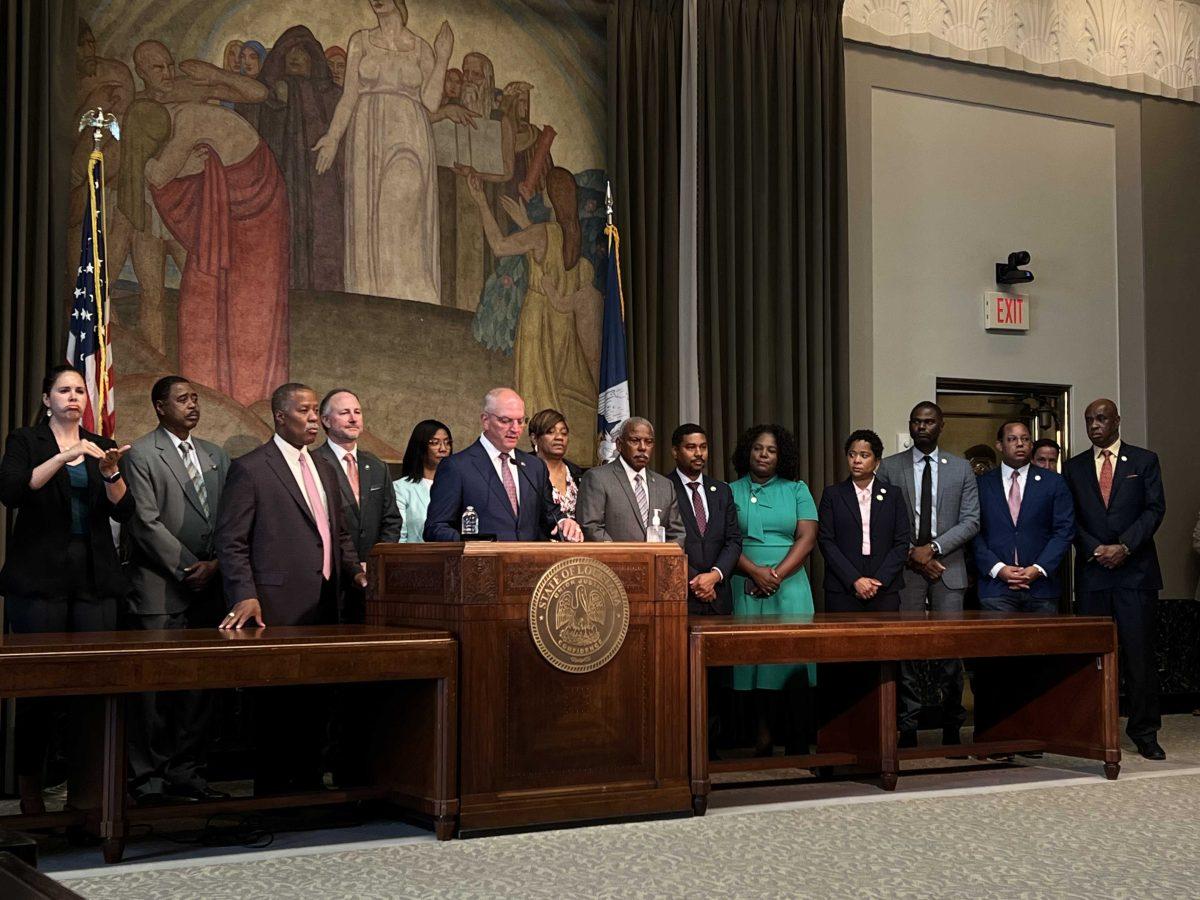The recently wrapped-up legislative session brought a myriad of changes to every aspect of higher education, including alterations to athletic policies, a tenure study committee and infrastructure investments.
The session ended Monday after last-minute negotiations to pass bills under a 6p.m. deadline. Gov. John Bel Edwards held a press conference shortly after where he spoke of how well the session went.
“You don’t always get everything that you want,” Edwards said. “Sometimes, you get things you don’t want, but on balance, I’m very pleased with what’s happened.”
Budget
The budget for this year passed through a largely bipartisan effort with only seven members voting against the proposed budget. Thanks to a surplus of cash this year, many requests for funding were granted. This included an increase in faculty pay for higher education.
The Legislature signed off on an average 3% raise for faculty members, although Edwards moved money around with line-item vetoes to restore that to the 5% raise he initially asked for.
The budget also provides funds to recruit faculty members for high-priority programs, like cancer research.
Edwards called the budget “transformational.”
LSU will be receiving $2 million for the planning and design phase of the new library, $1 million for maintenance on the Renewable Natural Resources building and $1.5 million for deferred maintenance at LSU.
LSU Health Sciences Shreveport made out far better than LSU A&M in terms of infrastructure funding, receiving $28 million for five projects.
Athletics
Senate Bill 250, sponsored by Sen. Patrick Connick, R-Marrero, would remove the current provision in law that prohibits universities from paying athletes for their name, image and likeness, although NCAA and institution rules may still prohibit it.
Previously, this compensation could not come from the university itself. If signed by Gov. John Bel Edwards, this bill would remove the restriction from “an entity whose purpose includes supporting or benefiting such institution or its intercollegiate athletic programs.” The Tiger Athletic Foundation would fall within this category.
The bill would also remove NIL contracts disclosed to institutions from public record and free the institution’s employees from liability for an athlete’s ability to earn compensation given a player faces an injury resulting from normal gameplay.
Senate Bill 44, sponsored by Sen. Beth Mizell, R-Franklinton, was dubbed the “Fairness in Women’s Sports Act.” This bill passed into law without the governor’s signature.
The bill prohibits transgender athletes in K-12 schools and college programs from competing in accordance with their gender identity. While NCAA rules allow transgender athletes to compete under certain circumstances, the bill would potentially be of superceding authority.
Edwards shut a similar bill down last year through a veto.
“Since that bill was first put on my desk, there hasn’t been a single instance in Louisiana of a trans girl participating in sports,” Edwards said. He went on to express he did not approve of this bill, but it became clear to him that the bill would become law whether or not he signed it.
Edwards said the situation Louisiana is in is unfortunate and that “we can be better than that bill.”
Credits and Tuition
The legislature passed several bills this session to make college less expensive for certain people and to make credit transfer between institutions easier.
House Bill 499, sponsored by Rep. Beryl Amedee, R-Houma, provides funding for tuition exemptions for persons age 55 or older. The tuition exemption and textbook reduction costs were already in law, but some universities and colleges could not provide them due to funding.
Senate Bill 76, sponsored by Sen. Cleo Fields, D-Baton Rouge, provides that any mandatory fee will be included in a compensation package for any graduate students that has a teaching assistant, research assistant or curatorial assistant position.
Both bills are waiting on the governor’s signature.
House Bill 231, sponsored by Rep. Ken Brass, D-Vacherie, was signed into law by Edwards on June 3. This act requires institutions to have “reverse articulation or reverse transfer agreements.” The transfer programs must be in place by fall 2023.
This act will allow any student to move from a four year university to a two-year college to complete the requirements for an associate degree without fear of losing credits.
The law was brought forward to help push for the state’s postsecondary attainment goals. The Board of Regents set the goal of having 60% of working adults hold a degree or credential by 2030. In Louisiana, only 32% of working age people have an associate degree or higher.
TOPS
Senate Bill 81, sponsored by Sen. Bodi White, R-Baton Rouge, would remove the income reporting requirements for TOPS recipients. White tried to remove other demographic information, including race, but it was amended in committee to only apply to income data
The precursor to TOPS, the Louisiana College Tuition Plan, was merit based and had income caps for recipients. Both TOPS and the Louisiana College Plan mimic Patrick F. Taylor’s efforts to make college attainable for the underprivileged of New Orleans.
TOPS caters to all students regardless of income and is merit based. According to the Board of Regents 2019 TOPS Report, over half the TOPS recipients from the 2018 graduating class had parental incomes over $70,000 a year.
The bill is awaiting action from the governor.
Administration
The Senate and House had several bills pass through their chambers regarding how universities should handle administration matters.
House Bill 364, sponsored by Rep. Scott McKnight, R-Baton Rouge, requires public postsecondary institutions to establish policies for nonacademic disciplinary hearings that use an advocate for the student’s defense.
The proposed law also includes requirements for student notification, appeals processes, file maintenance, and ensures they are free of conflict of interest.
Some universities may already be in compliance with this bill if it becomes law, but each institute will need to review their policies and edit them if needed.
Rep. Barbara Reich Freiberg, R-Baton Rouge, sponsored House Bill 888 to allow grants to certain schools if they receive the “Hunger-Free Campus” designation.
The designation has several requirements including creating action plans, notification of potential eligibility of SNAP to students, hosting anti-hunger awareness events yearly and maintaining a food pantry or providing access to a nearby pantry for students.
Grants will be given to public colleges and universities with this designation and to nonpublic institutes that serve low-income students disproportionately with the designation. The purpose of the grant is to assist the schools in raising awareness for resources for food assistance and food insecurity.
LSU already has some of these programs in place and said they would welcome enhancing the programs to fit the needs of this designation and help students.
Tenure
Senate Concurrent Resolution 6, sponsored by Sen. Stewart Cathey, R-Monroe, creates a task force to study tenure policies and recommend reforms.
The resolution does not need gubernatorial approval. The task force must begin meeting by August.
The resolution included language about “indoctrination” that indicated that Cathey was acting in line with Republican legislators in other states who have moved to curb tenure one way or another.
Tenure is considered a core tenet of academic freedom. It allows professors peace of mind when teaching and researching that they will not be subject to political or corporate interference with their work. With tenure, professors can only be removed from their position under extreme circumstances.
LSU President William Tate IV told The Reveille that he did not oppose the creation of the taskforce, but later added that he did not think it was necessary. Tate has consistently said that tenure is the hill he’d die on.
Bob Mann, a faculty member at LSU, was disappointed in the way LSU handled this situation.
“President Tate, among others, never publicly denounced or argued against the resolution,” Mann said. “If President Tate and others are sincere about wanting to beef up research at Louisiana universities, that means attracting senior faculty from other places who bring their expertise and grant dollars with them.”
LSU Spokesperson Ernie Ballard said that he felt that tenure is not in immediate danger. He said LSU will participate in the study for inquiry and discussion, and they “look forward to helping educate lawmakers on the value of tenure in both academic terms and market competitiveness for all universities in Louisiana.”
TOPS, tenure and transgender athletes: legislative session brought changes for every aspect of higher education
June 10, 2022
Gov. John Bel Edwards during a press conference held shortly after the end of the 2022 regular legislative session.







